All products featured are independently chosen by us. However, SoundGuys may receive a commission on orders placed through its retail links. See our ethics statement.
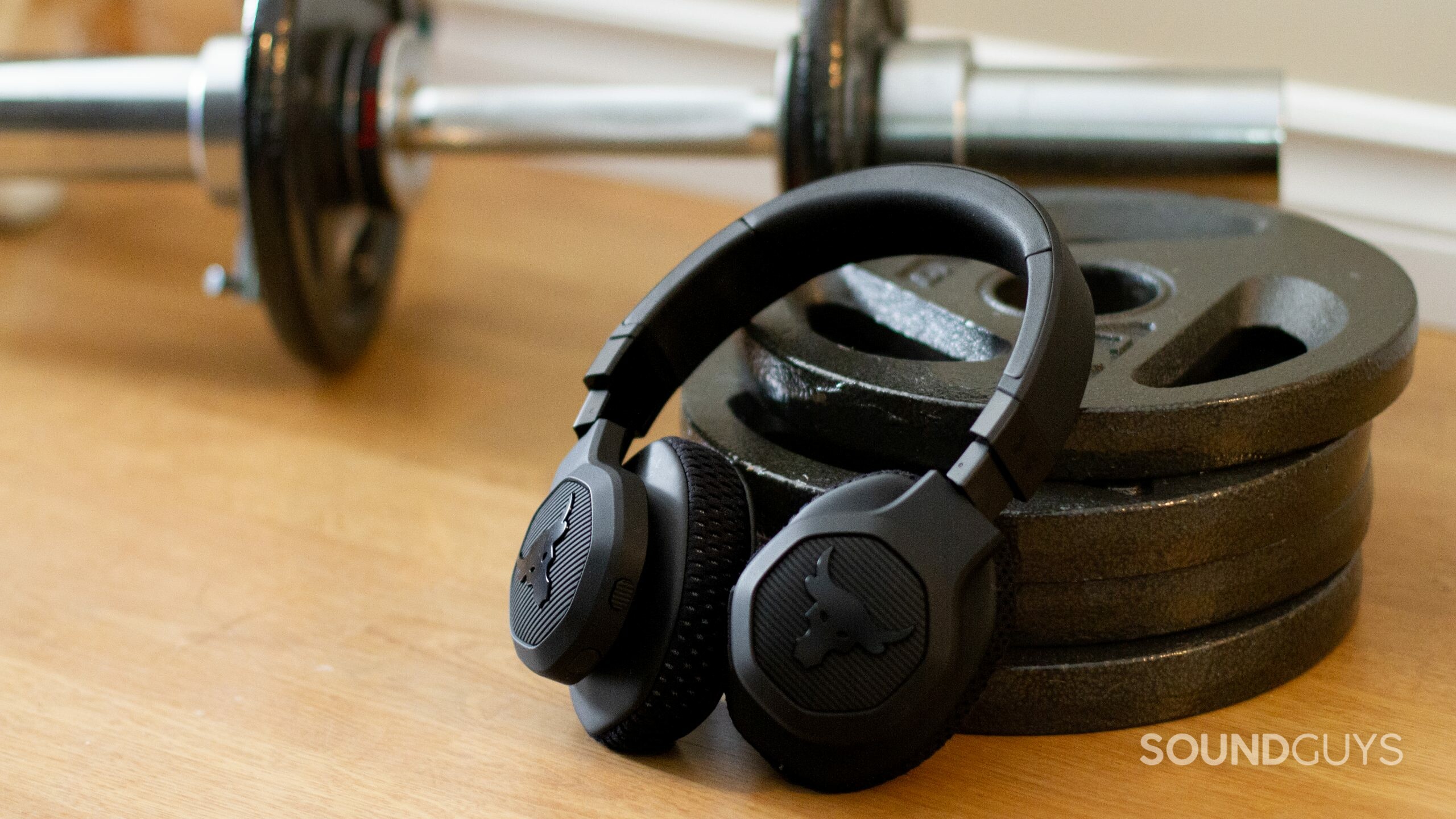
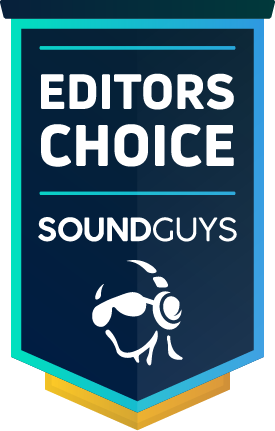
Under Armour Project Rock Over-Ear Training Headphones by JBL review
February 9, 2022


Under Armour Project Rock by JBL
You’ve heard the expression, too many cooks in the kitchen to suggest that things have gone wrong because of too many ideas or too much meddling. Fortunately, the many cooks involved in the Under Armour Project Rock Over-Ear Training Headphones Engineered by JBL did not meddle too much, except with long-winded names.
JBL is also owned by HARMAN, so it’s more like Under Armour by JBL, owned by HARMAN (a subsidiary of Samsung), and featuring Dwayne “The Rock” Johnson. It almost sounds like an entertaining dance track with a lot of guests. In any case, approximately four entities put in a lot of work to make your workout more fun and musically motivated, with productivity in mind. How did they all do?
Editor’s note: this Under Armour Project Rock Over-Ear Training Headphones by JBL review was updated on February 9, 2022, to include information about the microphone poll results and expand the list of buying options.
Who should get the Under Armour Project Rock?
- Bassheads will enjoy the bass emphasis of both the default frequency response and Dwayne Johnson’s custom EQ.
- Commuters and travelers can benefit from the long battery life and optional headphone jack with onboard noise cancellation.
- Audio tinkerers may find that the JBL Headphones app opens up a lot of custom EQ options to play with.
- Gym goers will want to reap the benefits of an IPX4 rating and TalkThru functions, as well as dedicated button controls.
What’s it like to use the Under Armour Project Rock Over-Ear Training Headphones?
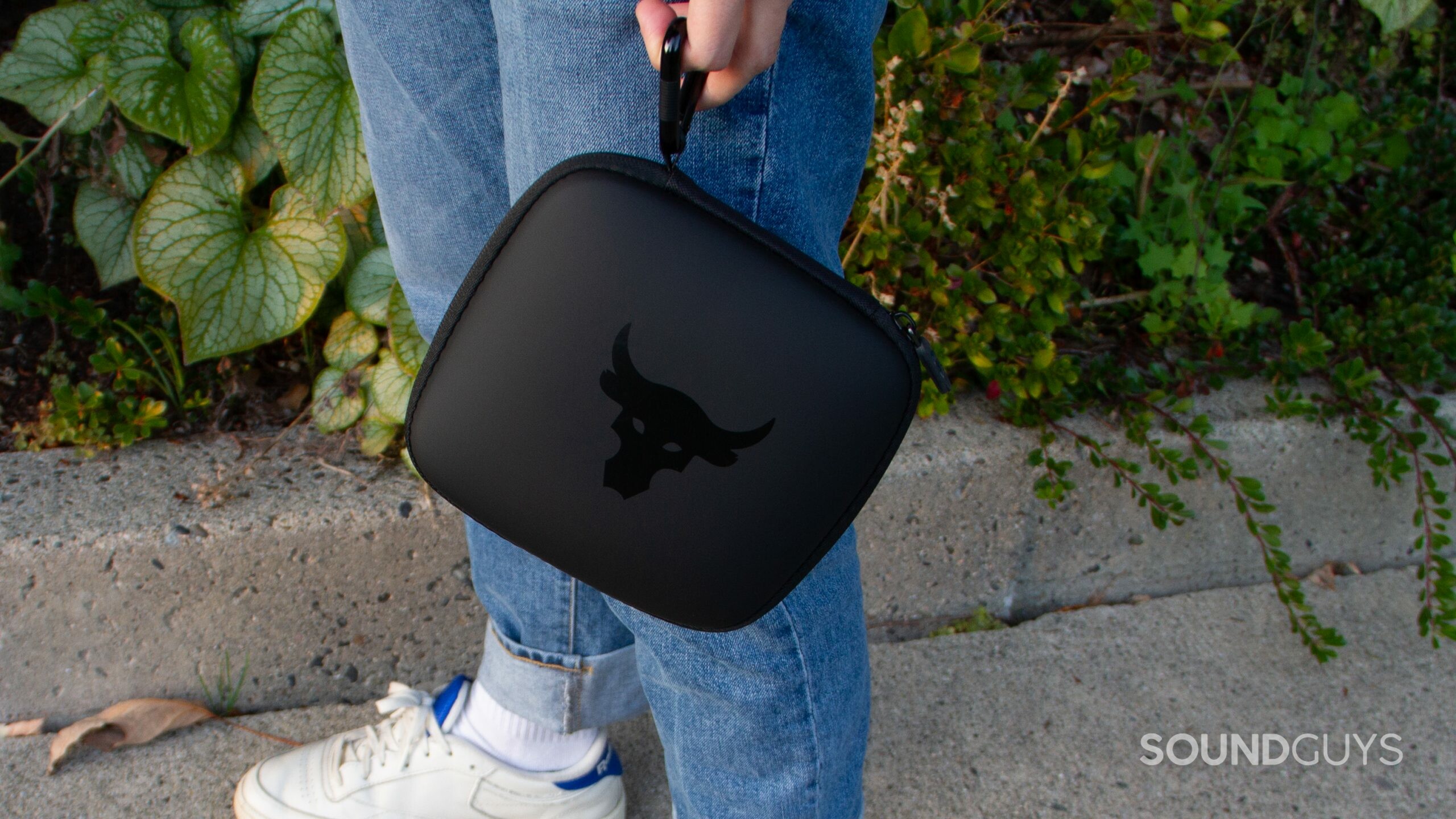
Under Armour (UA) and JBL provide a welcome amount of documentation with the Project Rock Over-Ear Training Headphones, including a wealth of instructions to walk you through its buttons and apps. You get an included 12-month subscription to UA’s MapMyFitness app with the headphones, in addition to the My JBL Headphones app. The headphone jack is an addition to the package that gets you the best possible sound quality, too.
Out of the box and over the ears with Project Rock
Project Rock’s build is a sturdy, almost rubber-feeling plastic affair with hints of an internal metal framework. It’s clear special attention is being paid to ear cushions, which sport a vinyl and foam mesh covering. The Project Rock Over-Ear Training Headphones holds on tight, but stays fairly comfortable for over an hour when worn with glasses. The vinyl can get hot even without exercise, which is a bit weird for fitness headphones. I wonder why Under Armour and JBL did not use the mesh foam for the entire ear cushion, as we see with the AirPods Max. Vinyl and light padding comprise the headband, which doesn’t provide much stability.
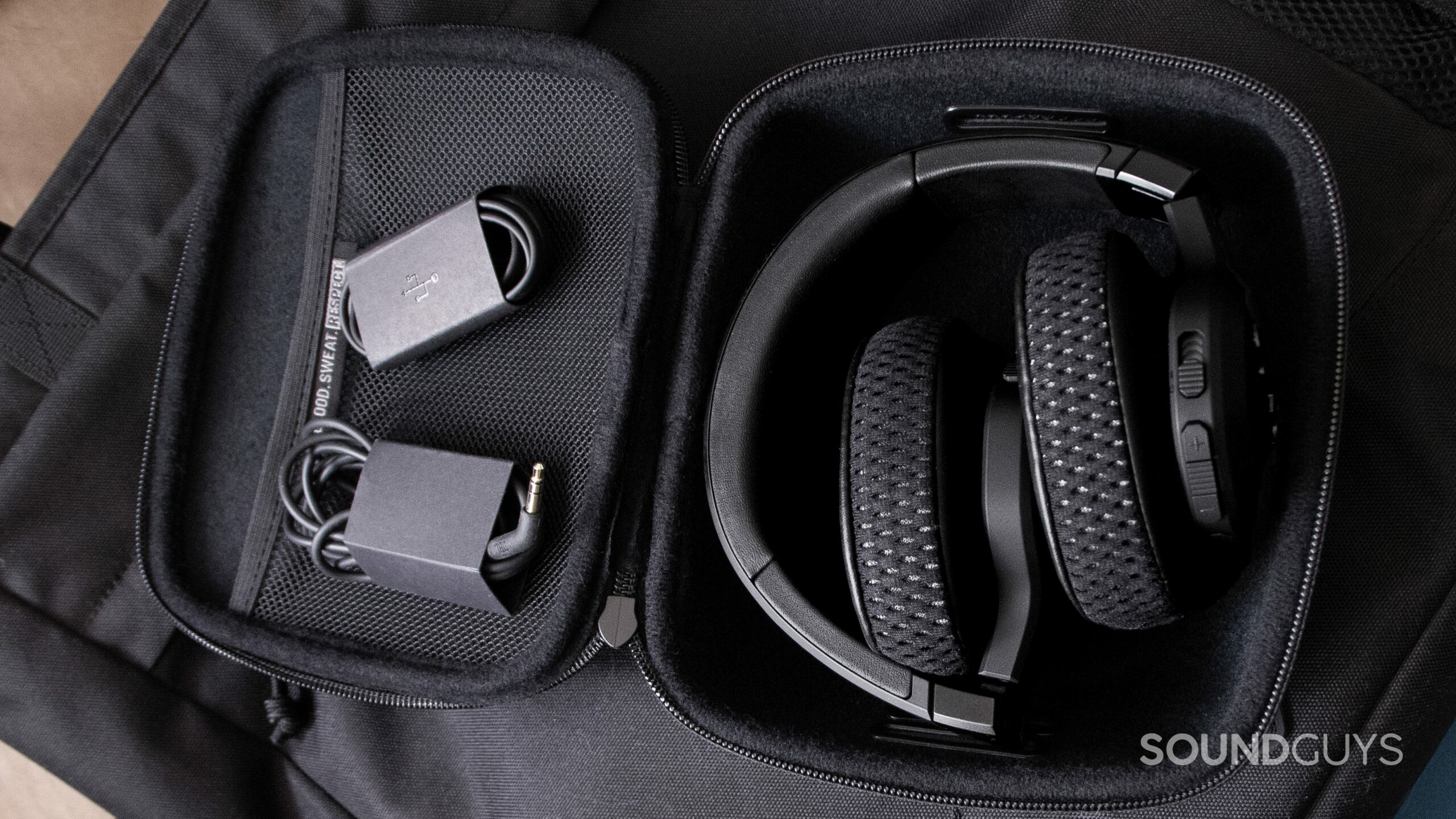
The aesthetic of Project Rock lands somewhere between over-engineered and bonkers like a Tonka truck with its exaggerated proportions. Even the Bluetooth pairing button is an excessive, ribbed slider with an ice blue light. The look’s grown on me over time, as I enjoy the effortless functionality with a hint of fun. You can trigger active noise cancellation (ANC), Ambient Aware, and TalkThru settings by pressing a silhouette of The Rock’s signature bull on the right ear cup. You adjust them in the accompanying app.
The large buttons and sliders make it easy to get direct access to controls. However, they’re all excessively textured and ribbed, which can make it difficult to know which button does what. Oftentimes, I press a button that turns out to be nothing but decoration. In time, you’ll probably get to know the tactile differences. The buttons curve towards the back of the ear cups, which makes ergonomic sense for thumbs and fingers.
How is the Under Armour Project Rock Over-Ear Training Headphones by JBL for working out?
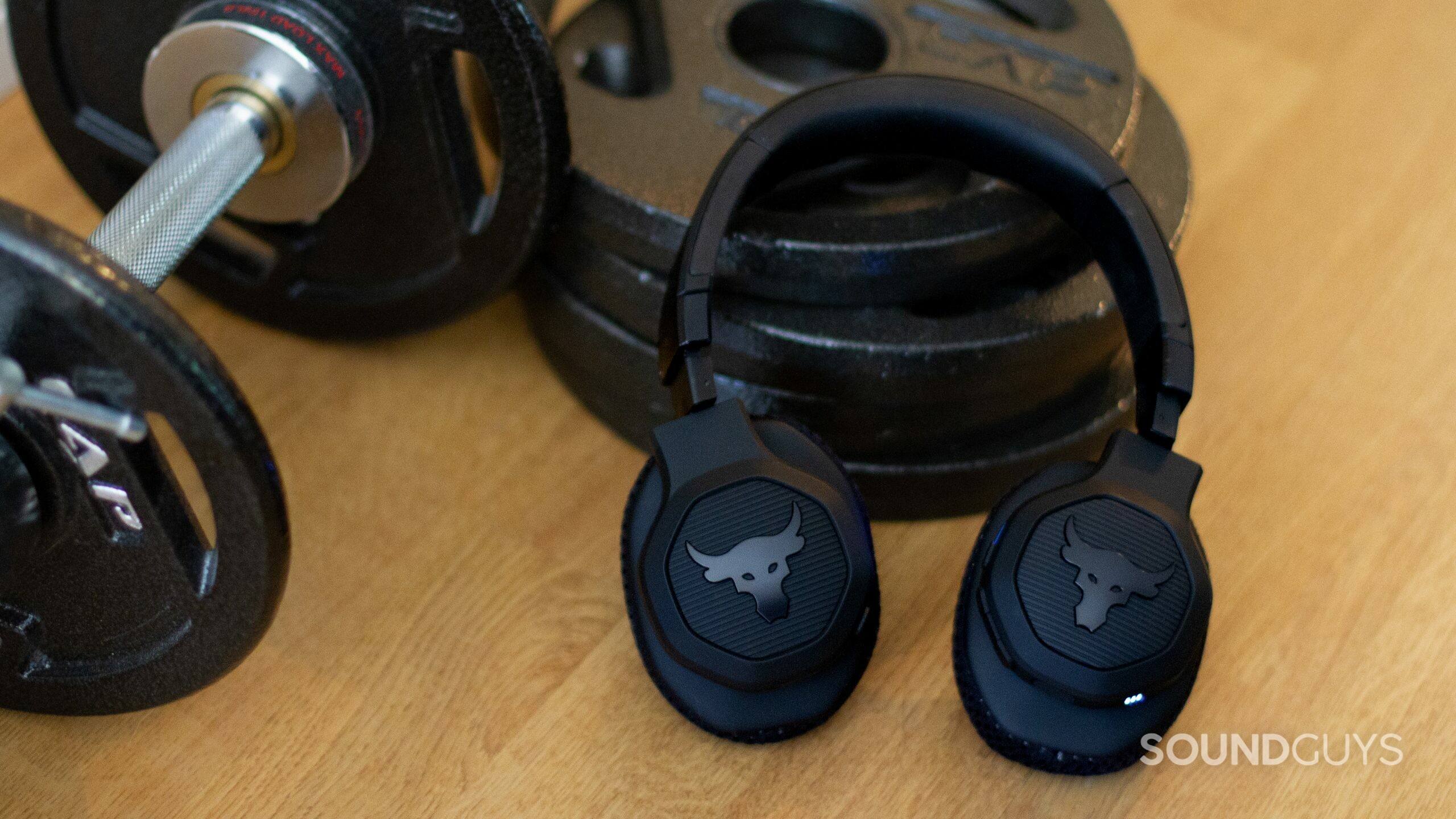
In the spirit of good, real-world testing, I broke out my dumbbells and put on the Project Rock headphones. The IPX4 rating promises sweat-proofing. You’ll appreciate having the IP rating on the UA Project Rock alongside the removable, and therefore washable, ear cushions.
For the most part, the headphones stay put during my workout, except when I lie on my bench to do dumbbell presses, at which point they fall off my head. The only upsides of this are that auto play/pause detection pauses my audio, and that the headset only slips onto the bench, as opposed to flying off while doing something else.
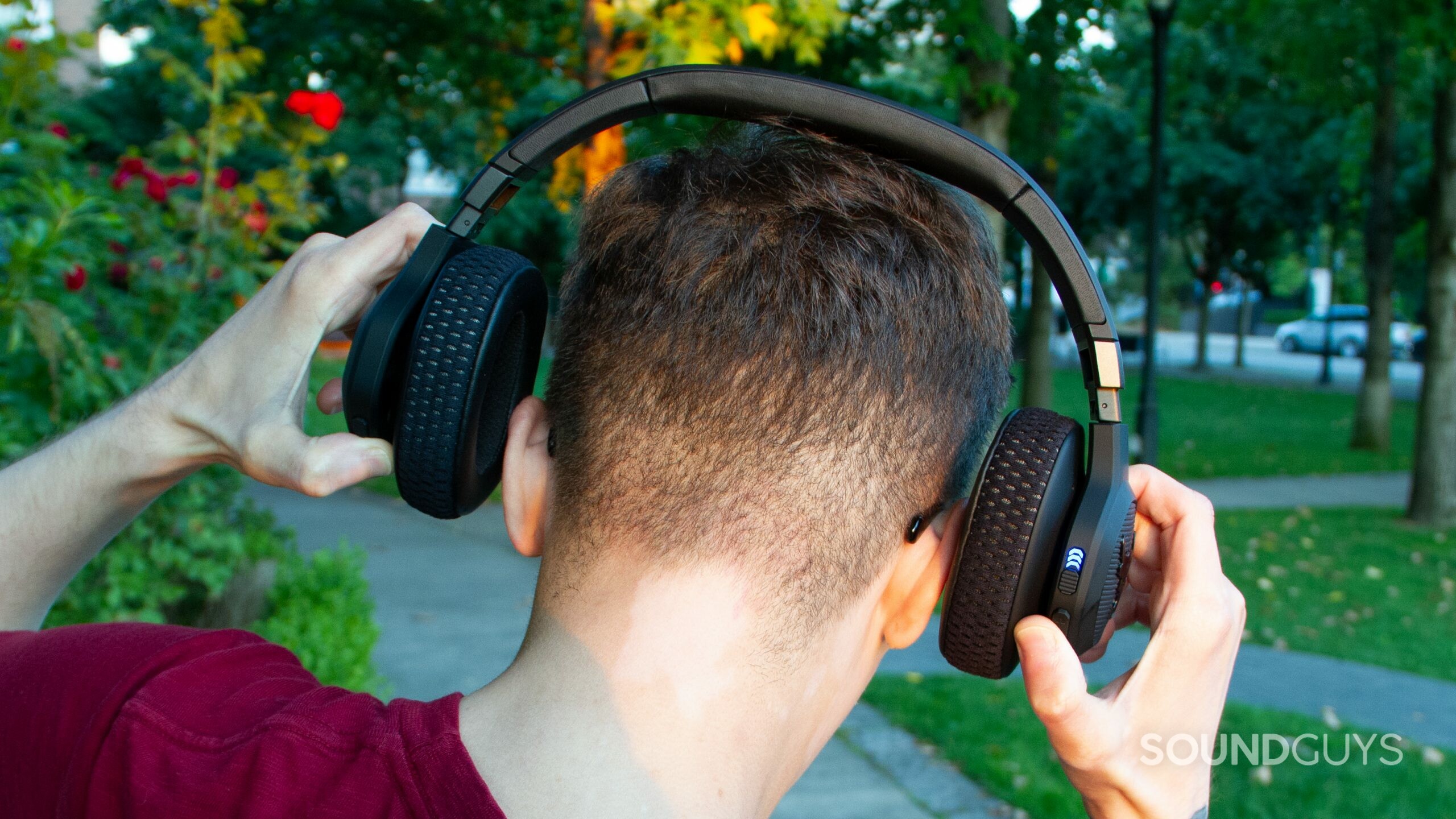
To give Under Armour, Dwayne Johnson, and JBL due credit, Dwayne Johnson probably did test the headset, but we are built completely differently. He’s nearly a foot taller than I, with a larger head for the headphones to grip on to. My workaround is to use my hair to kind of wedge the headband into place when doing any floor work. If you have an average or big noggin, this might not be an issue for you.
Should you download the My JBL Headphones app?
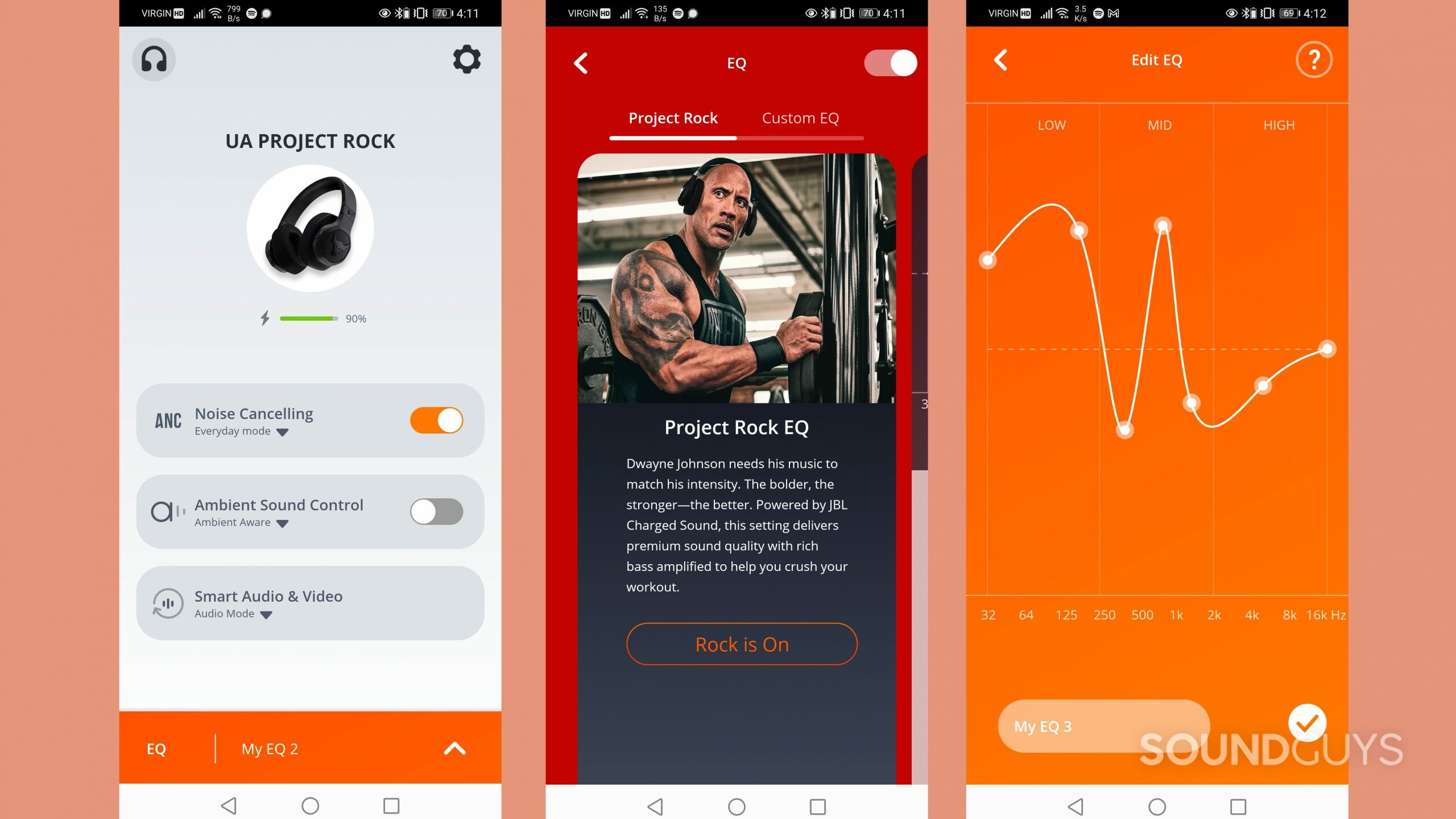
You should absolutely download the My JBL Headphones app (this review used version 5.1.2). While Project Rock has the majority of its features available at the press of a button (particularly if you use voice assistants), important features like firmware updates and custom EQ reside in the app. You can toggle through ANC settings such as Ambient Aware and TalkThru (basically quieting your music so others can speak to you), as well as audio quality settings.
Related: Why do my headphones sound bad?
Possibly the best feature in the My JBL Headphones app is customizable EQ settings, which you can draw in for yourself. This flexibility allows you to diverge from bass-focused frequency responses. Though, it’s very fun and amusing to tap “Activate The Rock,” the associated EQ profile basically masks a lot of the mids and highs. Fortunately, you can rescue it with an alternate EQ, or go ape with it and turn it up if you want even more bass.
This feature alone transforms the Under Armour Project Rock into a fairly flexible and useable headset. Project Rock is capable of blasting your ears with bass when you want, or tuning EQ for listening to podcasts.
What Bluetooth codecs does the Under Armour Project Rock Over-Ear support?
Like most JBL wireless products your options are AAC and SBC for codecs. Transmitted over SBC latency gets down to 190ms, while over AAC it’s 230ms. This number varies by device quite a bit as we have discussed here. If you want the least latency for videos, use that handy headphone jack.
Related: Best JBL headphones
Bluetooth 5.0 connects to the Under Armour Project Rock when you activate the slider on the right ear cup and hold it for two seconds. An icy blue light indicates through blinking that pairing mode has initiated, Project Rock also does a great job maintaining a steady connection. You could probably leave your phone in the locker room and hit the weights without a hitch—depending on how large the gym is, of course.
How long is the battery life of the Project Rock Over-Ear Training Headphones by JBL?
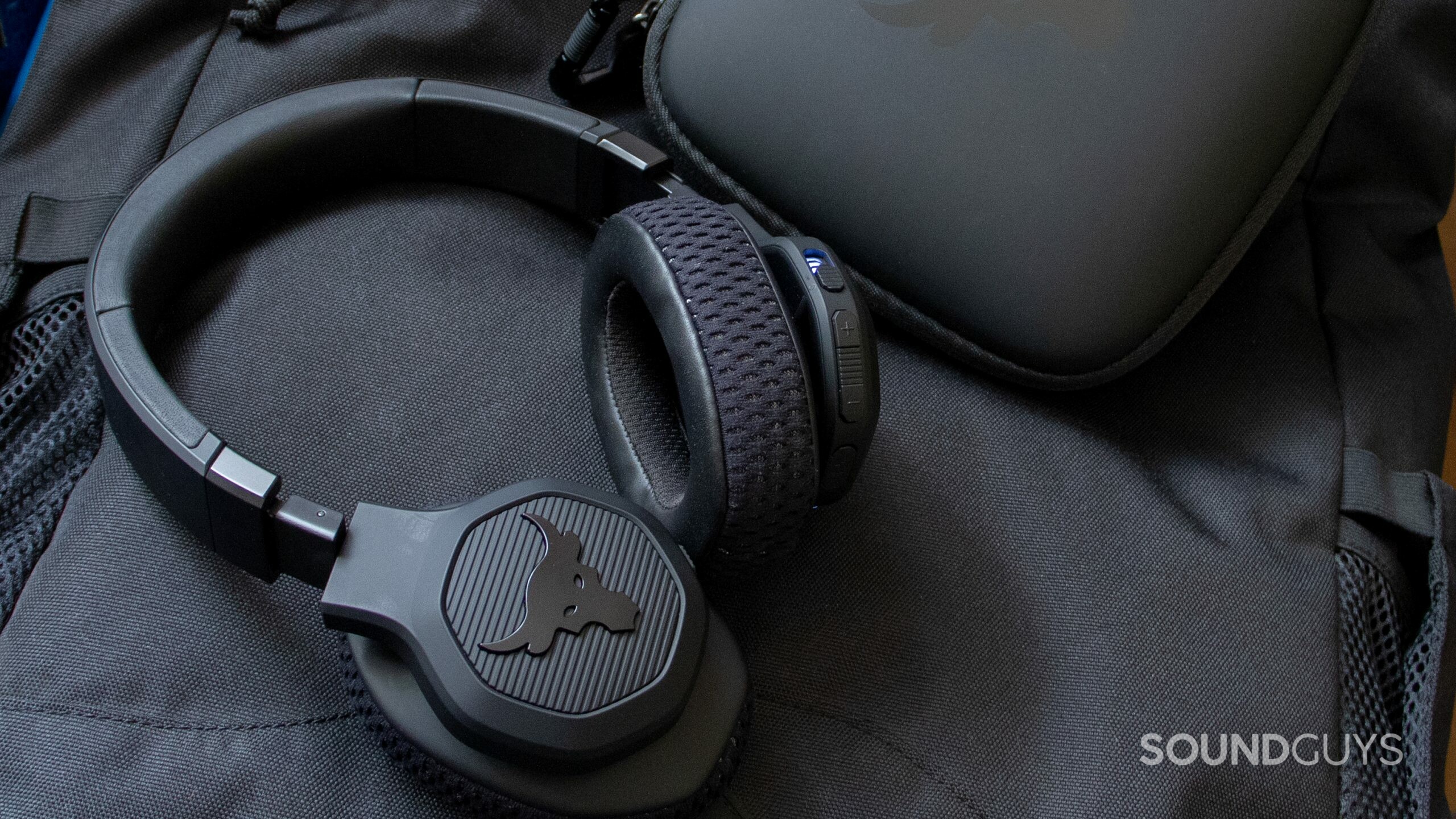
You get an impressive 41 hours and 13 minutes of battery life with the Project Rock. That figure is with ANC activated too, so you can block out the world for nearly two days straight. With a USB-C connection and the cable included in the box, a five-minute speed charge provides you 120 minutes of battery power. That’s enough time to charge it, while you brush your teeth and tie your shoes on the way to the gym or work.
The Bluetooth pairing slider doubles as a power-saving standby switch too, so if you don’t pick up your headphones for a couple of days, it won’t die in the meantime. Not anywhere near an outlet or a computer? Use that headphone jack. Under Armour and JBL cover all your bases here.
Does the Project Rock Over-Ear Training Headphones have good noise canceling?
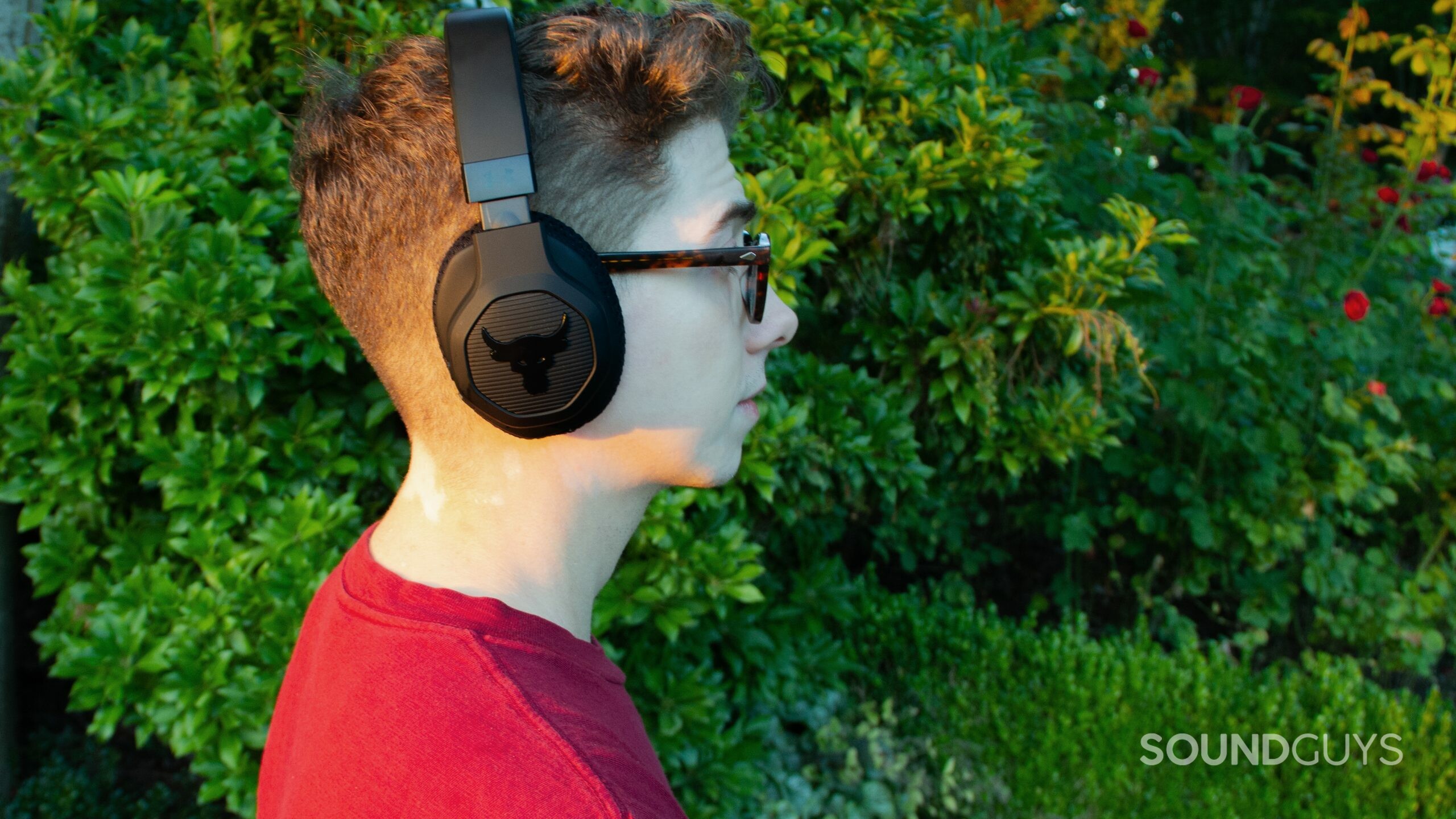
For the most part, noise canceling works best at attenuating low-pitched frequencies that repeat with little variation, like airplane din. The Project Rock headset focuses ANC efforts on low and midrange frequencies, complementing the passive isolation’s treble attenuation. You don’t get silence, but JBL has done a good job of quieting the environment across the audio spectrum.
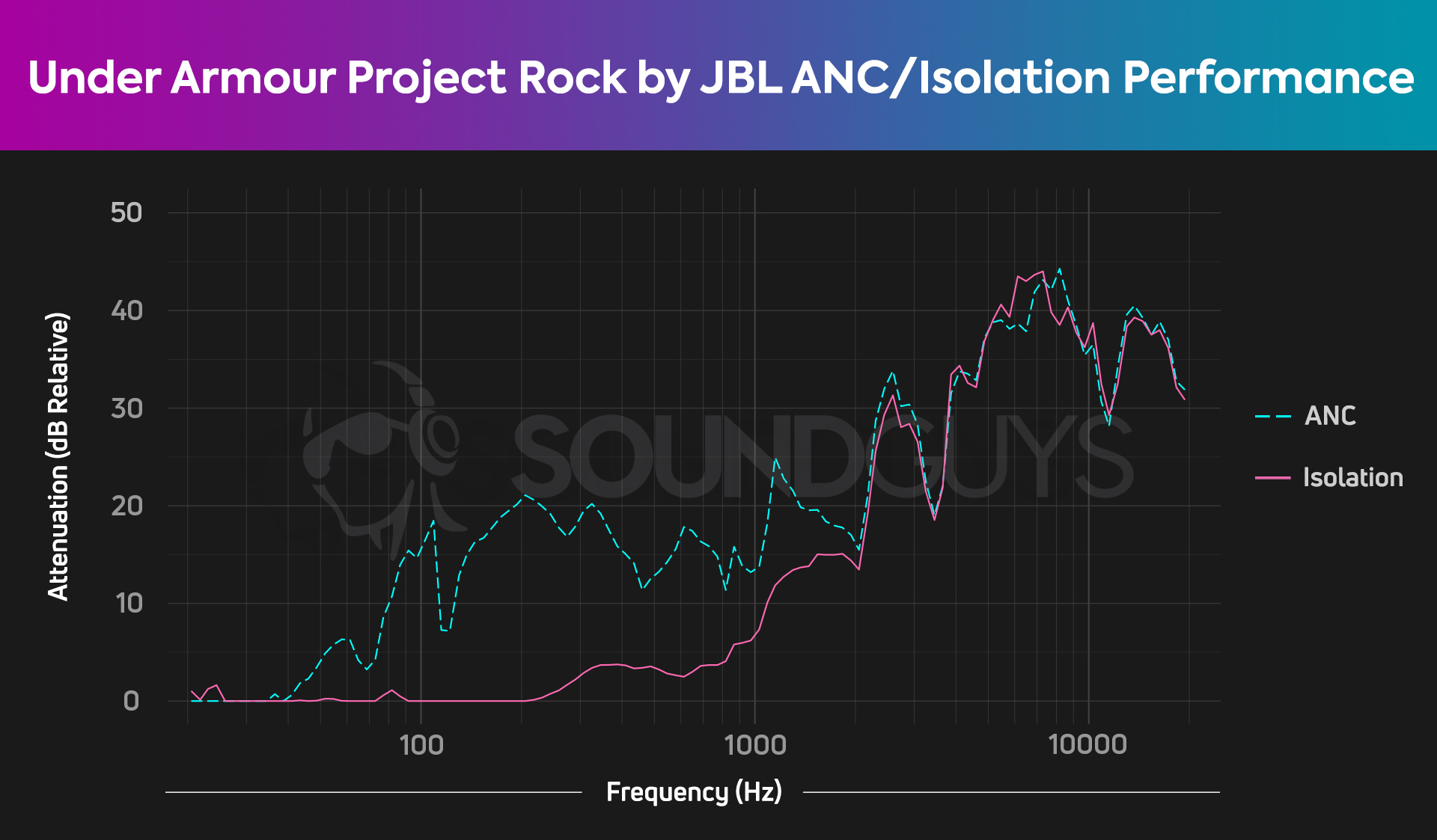
In use, the headphones transform my air conditioner into a sort of quiet midrange whistling noise. Though still audible, it is an improvement. Incidental high-pitched clangs, like that one person at the gym who drops free weights obnoxiously, are usefully reduced by the passive isolation.
How does the Under Armour Project Rock Over-Ear Training Headphones by JBL sound?
Look, you wouldn’t ask an astronomer to take over as head chef at a Michelin star-rated restaurant. So, why ask Dwayne “The Rock” Johnson, known best as an athlete and actor—not a sound engineer—to make a custom EQ for your headphones?
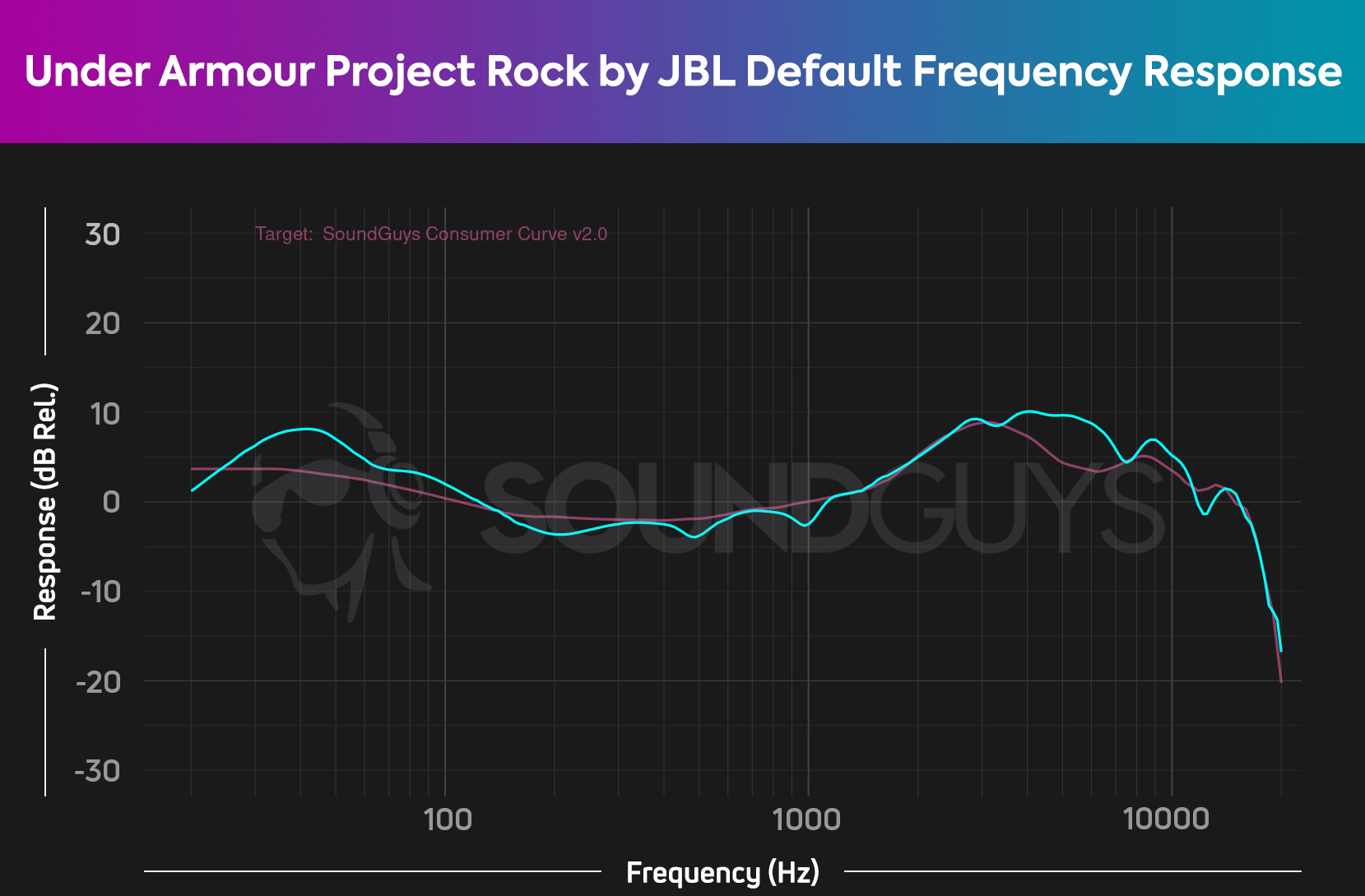
We tested the frequency response of two EQs available on the Project Rock, the default EQ and Dwayne Johnson’s Project Rock EQ. Both supply ample bass emphasis, with The Rock’s feeling almost unlistenable with its exaggerated bass. My usual electronic workout music sounds far too bassy, which makes customizing the EQ necessary.
As my colleague Chase Bernath points out, acoustic or indie music that’s less bassy receives a more tolerable bump of lower frequency oomph with The Rock’s Project Rock EQ.
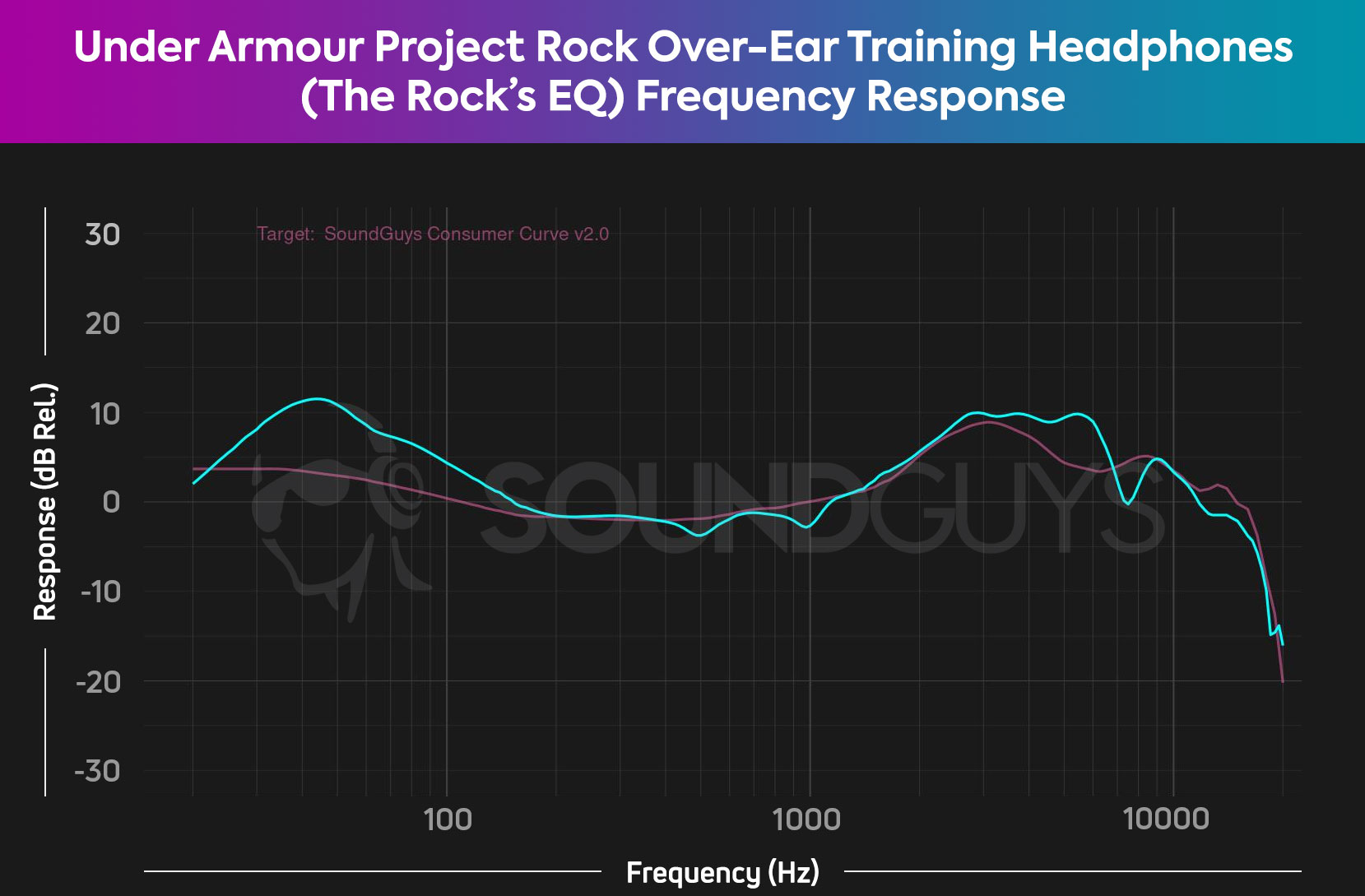
So, does The Rock lift to the Indigo Girls? (I checked.) His Spotify playlist from 2020 is populated mainly by rock and some hip-hop. This urges me to wonder why he and JBL got silly with the bass when he listens to genres that already have a lot of bass in the mix. Upping bass emphasis to already bassy music is like salting already salty fries. Some people apparently prefer it.
Lows, mids, and highs
With the Project Rock EQ picked by Dwayne Johnson, the acoustic and vocal harmony laden song, Closer to Fine by Indigo Girls receives an abundant boost in the bass frequencies. The quietly mixed bass guitar and sparse kick drum sound unusually loud. Vocal harmonies still cut through, but get partly masked by the exaggerated bass. The only reason the vocals remain fairly audible is because the song does not have much of a bass presence to begin with. Meanwhile, the acoustic guitar gets masked by the bass.
The same track on the default EQ suffers from some of the same issues, though to a lesser degree. Bass still masks other frequencies, but reproduction of vocals and acoustic guitar strings sounds fairly accurate. By no means, however, is this frequency response accurate.
Related: Best headphones for bass
Grabbing a track off Dwayne Johnson’s own playlist, Rock & Roll Band by Boston, the default EQ sees bass frequencies slightly masking the snare and cymbals. Falsetto vocals come through well. Switching to Project Rock custom EQ reminds me of standing outside a car blasting the radio with the door closed: the falsetto vocals are very hard to hear above the bass guitar and kick drum masking those mids and highs. The compressed, distorted lead guitar gets lost under the force of the bass frequency’s exaggeration.
If you get the Project Rock headphones and want to adjust the EQ, open the app. Try following our EQ suggestion in order to avoid too much bass, or hearing too little midrange.
Exaggerated frequency responses basically make most people want to turn up the volume because they can’t hear everything adequately. The problem with this stems from auditory masking tricking you into thinking you can’t hear something because the brain chiefly processes whatever sounds loudest. We want you to keep your hearing and resist the urge to increase up the volume. Instead, consider an EQ adjustment. When you can hear every instrument, which the suggested EQ adjustment helps attain, you don’t need to turn it up.
Can you use the Under Armour Project Rock for phone calls?
I have no trouble speaking on the phone with the UA Project Rock headphones with a fan on. The mic response attenuates bass and lower midrange frequencies, so your voice may sound artificially trebly.
Under Armour Project Rock Over-Ear Training Headphones microphone demo:
How does the microphone sound to you?
As of February 9, 2022, 37.5% of readers deem the mic system as Okay and 33.8% rate it as Bad. In other words, it’ll work in a pinch, but the UA Project Rock isn’t likely to to replace your go to Zoom call headset.
Hold up! Something’s missing:
We’ve made a big improvement to how we demonstrate the microphone performance of products we review. We now use a standardized test setup that plays back pre-recorded phrases from a calibrated artificial mouth in our test chamber, either with or without simulated background noises, simulated reverberant spaces, or artificial wind. This means that samples from every product can be directly compared, which makes it far easier to make meaningful comparisons between products in terms of the raw speech quality or the product’s ability to reject noise.
It will take a while to update our backlog of old test results, but we will update this review (and many others!) once we’re able with improved microphone demos. These will be made obvious in each new sample which begins with the phrase, “This is a SoundGuys standardized microphone demonstration …”
Thank you for bearing with us, and we hope to see you again once we’ve sorted everything out.
Should you buy the Under Armour Project Rock Over-Ear Training Headphones?
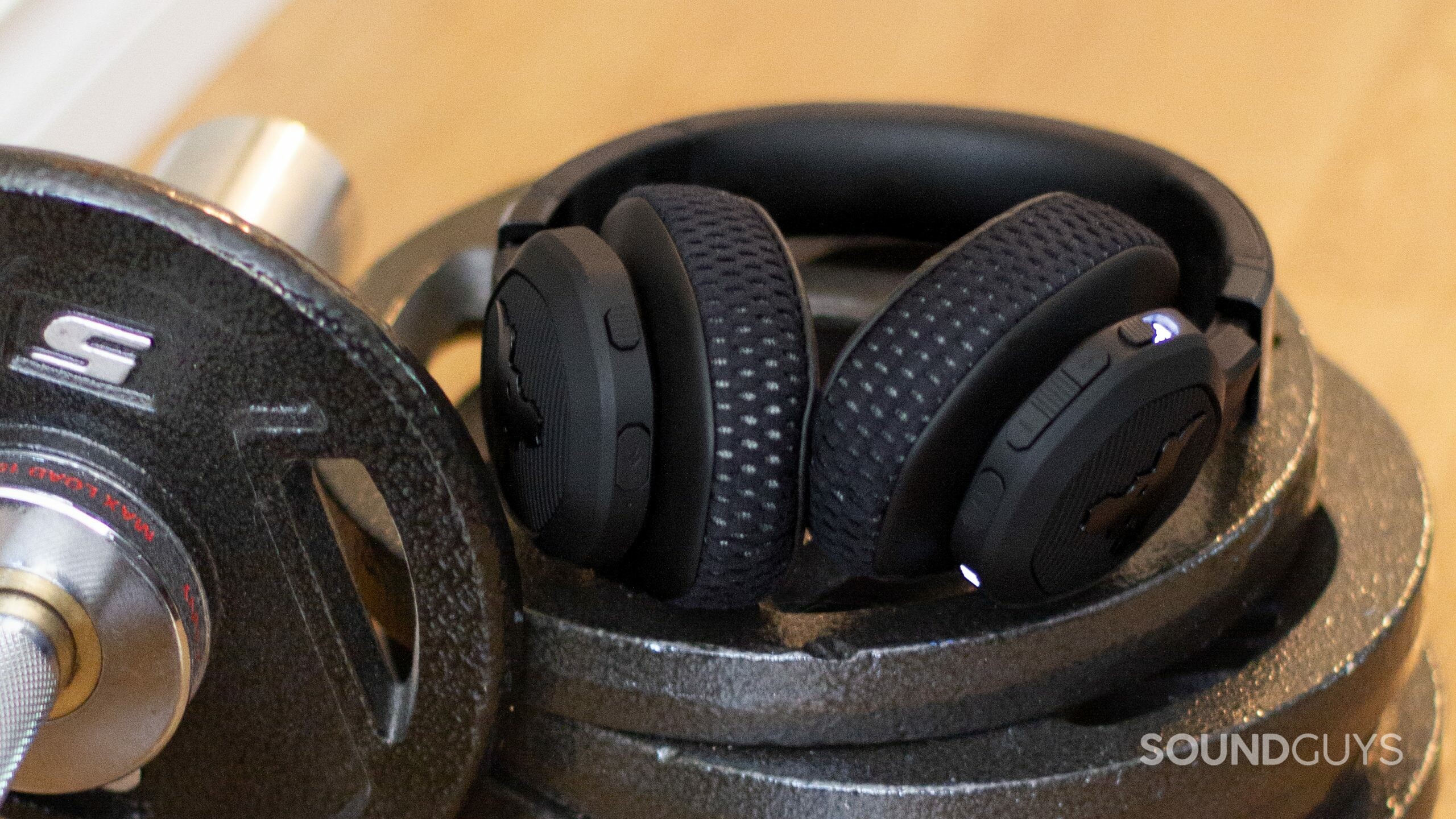
If you want a set of workout headphones with a lot of dedicated buttons, and a solid connection, try the Under Armour Project Rock. It has a little bit of everything: from ANC to TalkThru and a dedicated app. With removable and washable ear cushions, you get a sanitary and reasonably comfortable experience. However, the bass response is a little bonkers (but maybe you like that) and the vinyl gets hot. Those of us with smaller skulls than The Rock might also find the headband a little loose, but upright listeners needn’t worry.
At about $300 USD upon release, you’ll find quite a lot of competition. For less money, you can get good workout headphones. Does the Project Rock do everything you want and pretty well? Conceivably, you can do more than simply exercise with this headset. Its battery life and optional headphone jack with ANC make it a good candidate to accompany you on a long flight, or on your daily commute. If the Under Armour Project Rock Over-Ear plays the part of two headphones, the price seems reasonable.
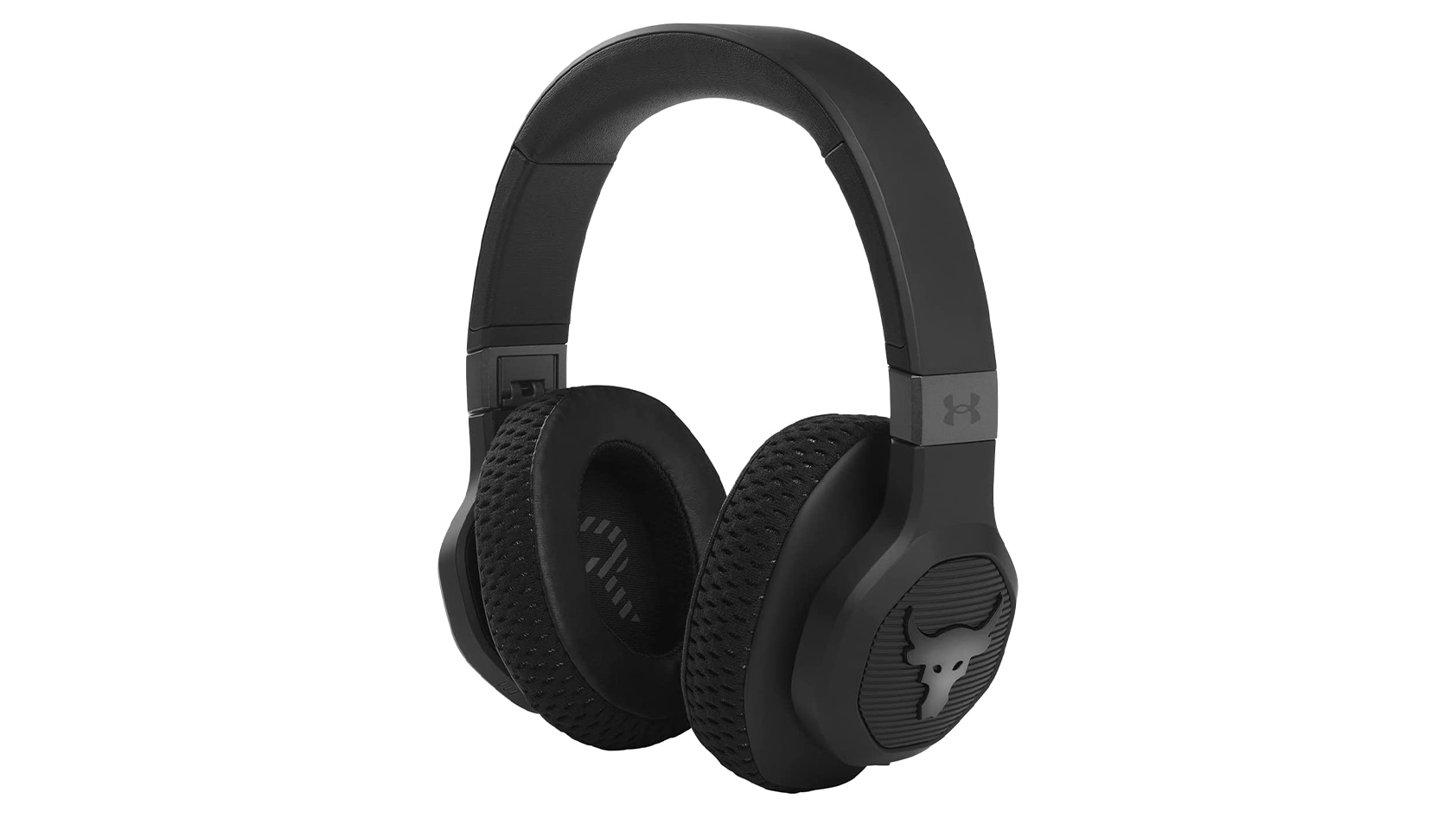
What should you get instead of the Under Armour Project Rock Over-Ear Training Headphones?
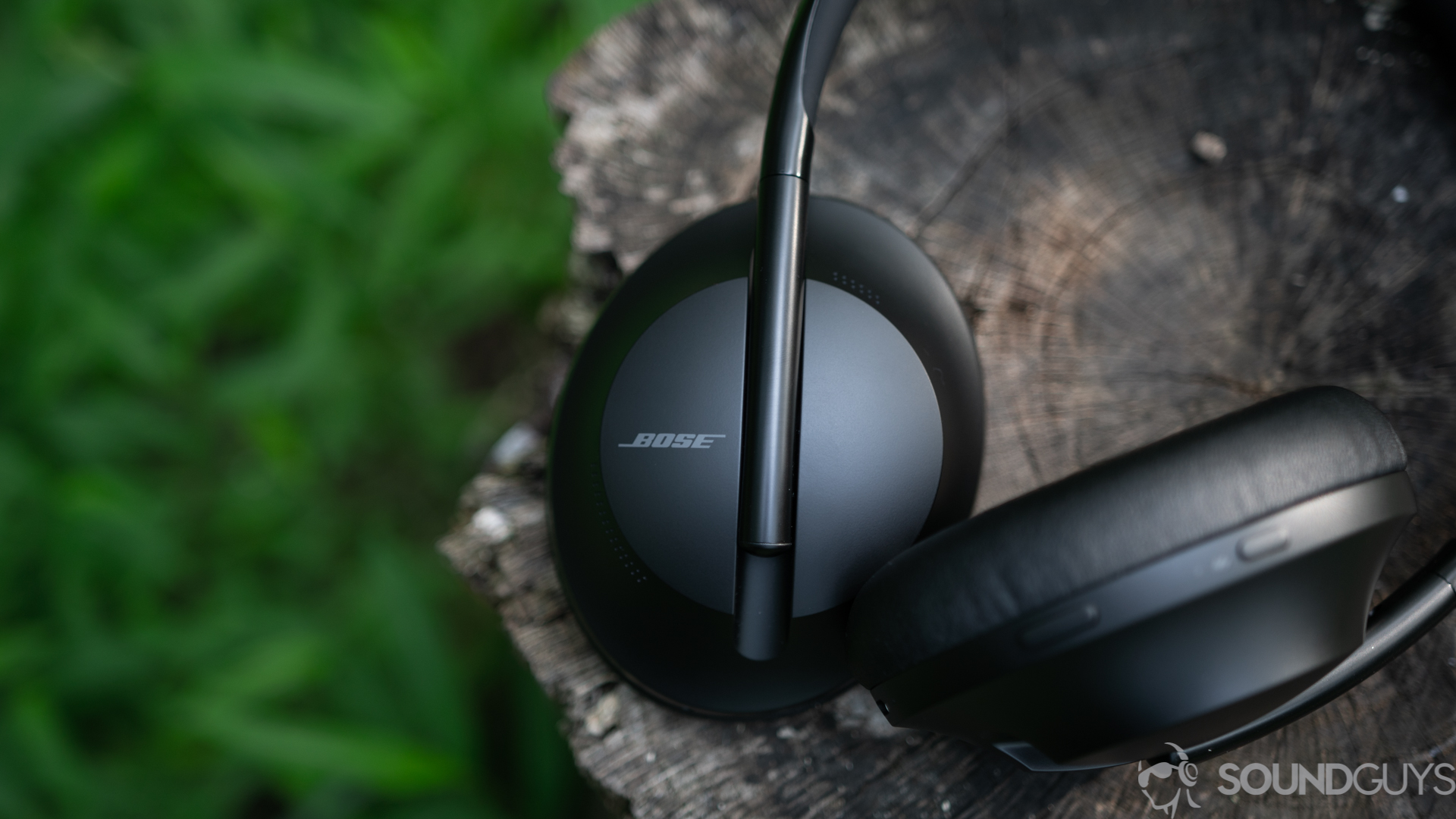
The answer sort of depends on what you want from your headphones. For less than Under Armour’s over-ear headset, the Shure AONIC 40, which supports Android-friendly codecs like aptX, a premium build, but has slightly worse ANC. You can’t really take it to the gym though, so something like the Bose Noise Canceling Headphones 700 might be preferable. It’s similarly spec’d with IPX4, better ANC, and consumer-friendly frequency response. Unlike Project Rock, the Bose headset doesn’t fold down—the ear cups rotate flat, at least.
Frequently asked questions about the Under Armour Project Rock Over-Ear Training Headphones
A close relative to the Project Rock is another Under Armour/JBL collaboration, the Train Sport Wireless On-Ear Bluetooth Gym Headphones. It goes for around $100 USD less than UA Project Rock. Sporting an on-ear fit, it is less comfortable, but more portable. You also get only 16 hours of playback, falling quite short of the Project Rock’s lifespan, though the sweatproof cushions feel similar. When you look at the alternatives, it’s easy to see how this collaboration between Under Armour, JBL, and Dwayne Johnson really fills a niche.
To pair the Project Rock Over-Ear headphones, follow these steps:
- Open your smartphone settings and enable Bluetooth.
- Turn your headphones on, and hold the power slider up for three seconds. The headphones will enter pairing mode.
- Select the Under Armour headset in your Bluetooth menu.
To connect a new device, press and hold the play/pause button for three seconds.